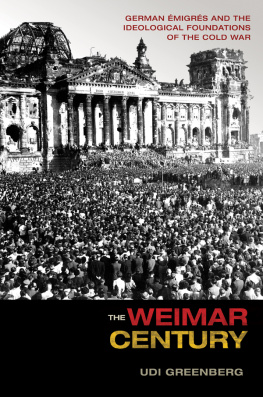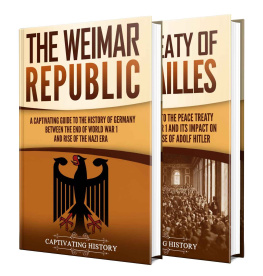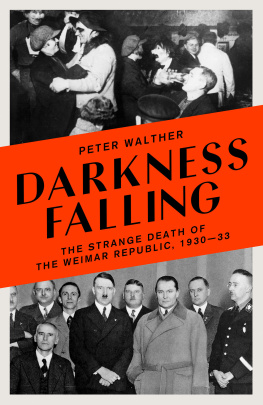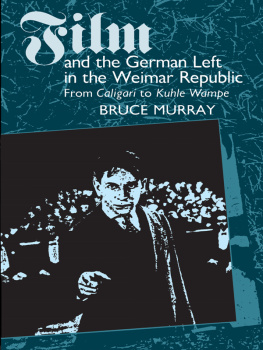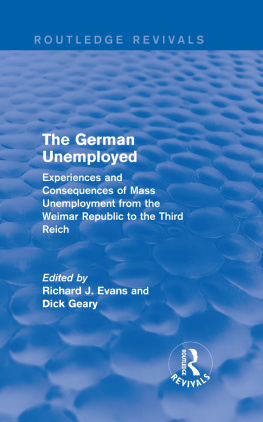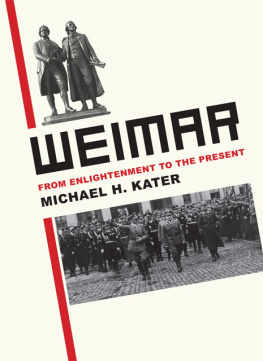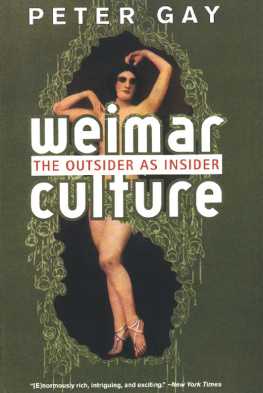Udi Greenberg - The Weimar Century: German Émigrés And The Ideological Foundations Of The Cold War
Here you can read online Udi Greenberg - The Weimar Century: German Émigrés And The Ideological Foundations Of The Cold War full text of the book (entire story) in english for free. Download pdf and epub, get meaning, cover and reviews about this ebook. year: 0, genre: History. Description of the work, (preface) as well as reviews are available. Best literature library LitArk.com created for fans of good reading and offers a wide selection of genres:
Romance novel
Science fiction
Adventure
Detective
Science
History
Home and family
Prose
Art
Politics
Computer
Non-fiction
Religion
Business
Children
Humor
Choose a favorite category and find really read worthwhile books. Enjoy immersion in the world of imagination, feel the emotions of the characters or learn something new for yourself, make an fascinating discovery.
- Book:The Weimar Century: German Émigrés And The Ideological Foundations Of The Cold War
- Author:
- Genre:
- Year:0
- Rating:4 / 5
- Favourites:Add to favourites
- Your mark:
- 80
- 1
- 2
- 3
- 4
- 5
The Weimar Century: German Émigrés And The Ideological Foundations Of The Cold War: summary, description and annotation
We offer to read an annotation, description, summary or preface (depends on what the author of the book "The Weimar Century: German Émigrés And The Ideological Foundations Of The Cold War" wrote himself). If you haven't found the necessary information about the book — write in the comments, we will try to find it.
Udi Greenberg: author's other books
Who wrote The Weimar Century: German Émigrés And The Ideological Foundations Of The Cold War? Find out the surname, the name of the author of the book and a list of all author's works by series.
The Weimar Century: German Émigrés And The Ideological Foundations Of The Cold War — read online for free the complete book (whole text) full work
Below is the text of the book, divided by pages. System saving the place of the last page read, allows you to conveniently read the book "The Weimar Century: German Émigrés And The Ideological Foundations Of The Cold War" online for free, without having to search again every time where you left off. Put a bookmark, and you can go to the page where you finished reading at any time.
Font size:
Interval:
Bookmark:

The Weimar Century
The Weimar Century
GERMAN MIGRS AND THE IDEOLOGICAL FOUNDATIONS OF THE COLD WAR
Udi Greenberg
PRINCETON UNIVERSITY PRESS
PRINCETON AND OXFORD
Copyright 2014 by Princeton University Press
Published by Princeton University Press, 41 William Street, Princeton, New Jersey 08540
In the United Kingdom: Princeton University Press, 6 Oxford Street, Woodstock, Oxfordshire OX20 1TW
press.princeton.edu
Jacket photograph: Anti-Communist protest in Berlins Republic Square, before the ruined Reichstag building, September 9, 1948. Image 2014 The Associated Press.
All Rights Reserved
Library of Congress Cataloging-in-Publication Data
Greenberg, Udi, 1980
The Weimar century : German migrs and the ideological foundations of the Cold War / Udi Greenberg.
pages cm
Includes bibliographical references and index.
ISBN 978-0-691-15933-1 (hardback : alkaline paper) 1. GermanyHistory19451955. 2. Military governmentGermanyHistory. 3. Nation-building. 4. Elite (Social sciences)GermanyBiography. 5. United StatesForeign relationsGermany. 6. GermanyForeign relationsUnited States. 7. United StatesForeign relations19458. United StatesMilitary policy. 9. Cold War. 10. Political scienceUnited StatesHistory. I. Title.
DD257.2.G65 2014
909.04310825dc23 2014013274
British Library Cataloging-in-Publication Data is available
This book has been composed in Sabon
Printed on acid-free paper.
Printed in the United States of America
10 9 8 7 6 5 4 3 2 1
Contents
Acknowledgments
I T IS WITH GREAT JOY that I write these acknowledgments, for the debts I owe to others are both wide and deep. This book was written over many years and in many placesJerusalem, Berlin, Leipzig, Madison, Berkeley, and Hanoverand at all stages, I was blessed with the support and generosity of friends, colleagues, and institutions. I am grateful for the chance to finally thank them all.
My first thanks go to the many scholars of European thought and politics who commented on my work and gave me invaluable encouragement and advice. They helped me develop my ideas, rescued me from countless embarrassing errors and misconceptions, and will recognize their insights in the best parts that follow. They will also recognize the places where my stubbornness led me to overlook their advice. Steven Aschheim, Moshe Zimmermann, and Dan Diner guided this books very first stages during my graduate studies in Jerusalem. Malachi Hacohen offered thoughtful insights as I embarked on rewriting and rethinking this project. Samuel Moyn and Jan-Werner Mueller made the effort to read a full draft of this manuscript, traveled to Dartmouth, and spent an invaluable day discussing it with me. They encouraged me to reconsider many issues, and provided thoughtful suggestions. Peter Gordons penetrating observations had a profound impact on this books final form. He pushed me to make explicit my own judgments about ideology and its political consequences, and my observations owe a great deal to his critique.
Other scholars whose valuable advice benefited this book include Michael Brenner, Arie Dubnov, Martin Jay, Rudy Koshar, Michael Gordin, Adi Gordon, Jerry Muller, Anson Rabinbach, Jeremi Suri, and Noah Strote, all of whom commented on parts of this project in different stages and formats and helped me improve it considerably. Thanks are also due to James Chappel and Giuliana Chamedes, who read the messiest parts of the manuscript with much care and attention. They will recognize my indebtedness to their work in many parts of this book. Ofer Ashkenazi deserves special acknowledgment for his incredible patience, friendship, and generosity as he repeatedly commented on lengthy drafts. I am especially grateful to my editor at Princeton University Press, Brigitta van Rheinberg. Her enthusiasm and professionalism have made the completion of this book a privilege, and her advice made me a better historian. I cannot think of a scholarly community more exciting and generous. This book is my first attempt to contribute to it.
I also thank my colleagues at Dartmouth College who provided valuable advice, mentorship, and assistance. I am thankful to Chris Hardy Wohlforth of the Dickey Center, who organized a manuscript review, and to Leslie Butler, Bill Wohlforth, and Klaus Mladek, who took part in it. They kindly gave me much of their time and provided phenomenal feedback, which helped me to drastically revise and improve this work. I am especially grateful to Ed Miller and Bob Bonner, who carefully read drafts, provided insightful suggestions, and spent many lunches offering mentorship, advice, and good conversation. I am also blessed with having Cecilia Gaposchkin and George Trumbull as colleagues; their friendship and guidance were profound. Thanks are also due to Susannah Heschel, who discussed this book with me on multiple occasions, and whose own work has been a source of much inspiration to me. Nancy Marion, associate dean for the social sciences, went above and beyond in her support, providing me with the resources I needed for research and writing. Dartmouth students Caitlin ONeil, Emily Tomlinson, Andrew Park, Rebecca Jacobson, and Ben Levander provided much-needed assistance. Becky Kohn, with her supernatural editing skills, made incomprehensible passages into readable prose and improved this text in more ways than she knows.
Thanks are due also to the many programs and institutions that have funded my research and hosted me over the years. These include the German Academic Exchange Program (DAAD); the Israeli Ministry of Education; the Simon Dubnow Institute in Leipzig; Studienstiftung des deutschen Volkes; the history departments at the University of CaliforniaBerkeley and the University of WisconsinMadison; the Walter and Constance Burke Research Initiation; and the Rockefeller Center at Dartmouth College. I am especially indebted to John Tortorice of the George Mosse Program at the University of Wisconsin-Madison. He provided me the first opportunity to come to the United States, and the two years I spent in Madison enriched my professional and personal lives in ways that I could never have imagined. John has supported me in countless ways ever since, and I cherish his generosity and friendship.
I am also pleased to thank the many archivists and librarians who helped me access countless forgotten documents and uncover dusty publications. They make the work of historians possible, and I would have missed many hidden treasures without them. In Europe, I received the help of archivists at the Bundesarchiv Koblenz; Hauptstaatsarchiv Dsseldorf; Kommission fr Zeitgeschichte in Bonn; Universittsarchiv der Ruprecht-Karls-Universitt, Heidelberg; Universittsarchiv der Freie Universitt, Berlin; and the Institut fr Zeitgeschichte, Munich; the British Library in London; and the London School of Economics. In the United States, I benefited from the assistance of the staff at the National Archives, College Park, Maryland; Leo Baeck Institute at New York; Harvard University; the Library of Congress, Washington, D.C.; Seeley G. Mudd Manuscript Library at Princeton University; the Rockefeller Foundation Archives in Tarrytown, NY; the University of Notre Dame; Amherst College; the New York Public Library; the Hoover Institute, Stanford University; and the library at Dartmouth College.
I would also like to thank the friends whose companionship made the completion of this work possible. Stephen Russell, Daniela Blei, and Sarah Cramsey made my time at Berkeley a joy. In Madison, I enjoyed the company of Vanessa Walker Gordon and Robbie Gross, who also hosted me for a month of research. Yulia Frumer kindly saved me much effort by copying documents at Princeton. I am grateful to Maya Maxwell, for her friendship and for her company during my time in New York. And finally, my thanks go to my friends in Israel, Eitan Grossman, Nadav Lazar, Yossi Weiss, Yishai Kessler, Maya Asher, Noam Badrian, and Doron Djerassi.
Next pageFont size:
Interval:
Bookmark:
Similar books «The Weimar Century: German Émigrés And The Ideological Foundations Of The Cold War»
Look at similar books to The Weimar Century: German Émigrés And The Ideological Foundations Of The Cold War. We have selected literature similar in name and meaning in the hope of providing readers with more options to find new, interesting, not yet read works.
Discussion, reviews of the book The Weimar Century: German Émigrés And The Ideological Foundations Of The Cold War and just readers' own opinions. Leave your comments, write what you think about the work, its meaning or the main characters. Specify what exactly you liked and what you didn't like, and why you think so.

